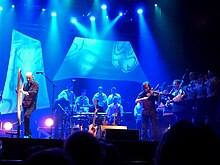Alan Stivell
Alan Stivell (born January 6, 1944 in Riom , France ; real name Alain Cochevelou ) is a French musician and singer of Breton music . He is particularly known as a harpist and for his combination of folk and rock music .
Life
Stivell grew up in the Morbihan department in southern Brittany and Paris and learned to play the piano as a young child . His father, Jord (Georges) Cochevelou, developed the first Celtic harp of modern times after this instrument had not been built or played for centuries. When Alan was nine years old, he began to play this harp, and shortly afterwards he made his first public appearance. In 1957 he began to learn the Breton language and to play the bagpipes . In 1966 his father built a Bardic harp for him, which, in contrast to the Celtic harp, has bronze strings.
In 1967 Cochevelou adopted the stage name "Alan Stivell". Stivell means “source” in Breton. The name refers to its French name Cochevelou , a reinterpretation of Breton kozh stivelloù ("the old sources"). For Stivell, the Celtic and the Bardic harp were a medium to feel connected to the Breton-Celtic culture and mythology, which was almost unknown and despised for a long time . He made the Celtic harp famous through numerous worldwide appearances. Through his singing, among others in Breton , Welsh , Irish and Scottish Gaelic , he was one of the first to focus on the historical and cultural ties of the island's Celtic settlement area.
At the end of 1976 Stivell was a guest at the Wiener Konzerthaus and made his appearance for the “ Fest-noz ”, the traditional folk festival in Brittany . Since the 1980s he has been constructing his own harps, both conventional and electro-acoustic.
In 2008, the asteroid (45299) Stivell, discovered two years earlier, was named after him.
In May 2009, Stivell played the “ Breton national anthem ” in the Stade de France before the kick-off of the purely Breton final for the French soccer cup between Stade Rennes ( Stad Roazhon ) and EA Guingamp ( War-raok Gwengamp ). On September 10, 2011, Alan Stivell performed live in Germany for the first time since 2007 at the Mediaval Festival in Selb .
Adaptations
The French hip-hop formation Manau adapted the refrain of the song Tri martolod, made famous by Stivell, for their hit La tribu de Dana , which led to legal disputes between the two parties. In 2008, the tune of Tri Martolod was also adapted by the folk metal band Eluveitie for their song Inis Mona . Nolwenn Leroy performed with Stivell in 2012 and interpreted several of his pieces. The German band Santiano also released a version of Tri Martolod .
The song Son ar chistr (from the album Reflets , 1970), made famous by Stivell , was covered in German under the title What we want to drink .
Discography
Studio albums
|

Stivell with Bagad at the anniversary concert at the Olympia in Paris, 2012
Live albums
Compilations
Albums in collaboration with other musicians
|
literature
- Laurent Bourdelas: Alan Stivell. Brest 2012, ISBN 2-84833-274-3 (French).
- Yann Brekilien (photographer Padrig Sicard): Alan Stivell ou le folk celtique . Quimper 1973, ISBN 978-2852570054 (French).
- Jonathyne Briggs: Sounds French: Globalization, Cultural Communities, and Pop Music in France. Oxford 2015, Chapter 4, ISBN 9780199377091 (English).
- Anny Maurussane, Gérard Simon: Alan Stivell ou l'itinéraire d'un harper hero. Paris 2006, ISBN 2-9526891-0-5 (French).
- Alan Stivell, Jacques Erwan, Marc Legras: Racines interdites / Gwriziad difennet. Jean-Claude Lattès, Paris 1979 (French).
- Alan Stivell, Jean-Noël Verdier: Telenn, la harpe bretonne. Brest 2004, ISBN 2-84833-078-3 (French; PDF version; 27.2 MB ).
- Alan Stivell and Thierry Jolif (photographer Yvon Boëlle): Sur la route des plus belles légendes celtes. Arthaud, Paris 2013, ISBN 2-08129-294-7 (French).
Web links
- Official Homepage (French)
Individual evidence
- ↑ Luc Le Vaillant: Alan Stivell, 54 years, refondateur de la musique bretonne. Maintient le cap local-global. À l'Olympia ce soir. Bardé de celtitude. . In: Liberation of December 8, 1988 (French). Retrieved January 8, 2016.
- ^ Alan Stivell, Jean-Noël Verdier: Telenn, la harpe bretonne. Éditions Le Télégramme, Brest 2004, p. 101, ISBN 2-84833-078-3 (French; PDF file ; 27.2 MB) Retrieved January 8, 2016.
- ↑ Erwan Chartier: La construction de l'interceltisme en Bretagne des origines à nos jours . Rennes, 2010, p. 542 (French; PDF file; 27.2 MB). Retrieved January 8, 2016.
- ^ Alan Stivell, Jean-Noël Verdier: Telenn, la harpe bretonne. Éditions Le Télégramme, Brest 2004, p. 123, ISBN 2-84833-078-3 (French; PDF file ; 27.2 MB) Retrieved January 8, 2016.
- ↑ Bettina Nowakowski: A true bard of "Celtic Rock" . In: Bietigheimer Zeitung . May 27, 2014, accessed January 8, 2016
- ↑ Georg Friesenbichler: Our wild years: the seventies in Austria , 2008, p. 210, ISBN 978-3205781516 .
- ↑ Breton Music: A Small Selection . In: www.bretagne-tip.de , accessed on January 5, 2016
- ↑ archiv.celtic-rock.de ( Memento from January 4, 2016 in the Internet Archive ). August 10, 2011
| personal data | |
|---|---|
| SURNAME | Stivell, Alan |
| ALTERNATIVE NAMES | Cochevelou, Alain (real name) |
| BRIEF DESCRIPTION | French musician and singer |
| DATE OF BIRTH | January 6, 1944 |
| PLACE OF BIRTH | Riom , France |


